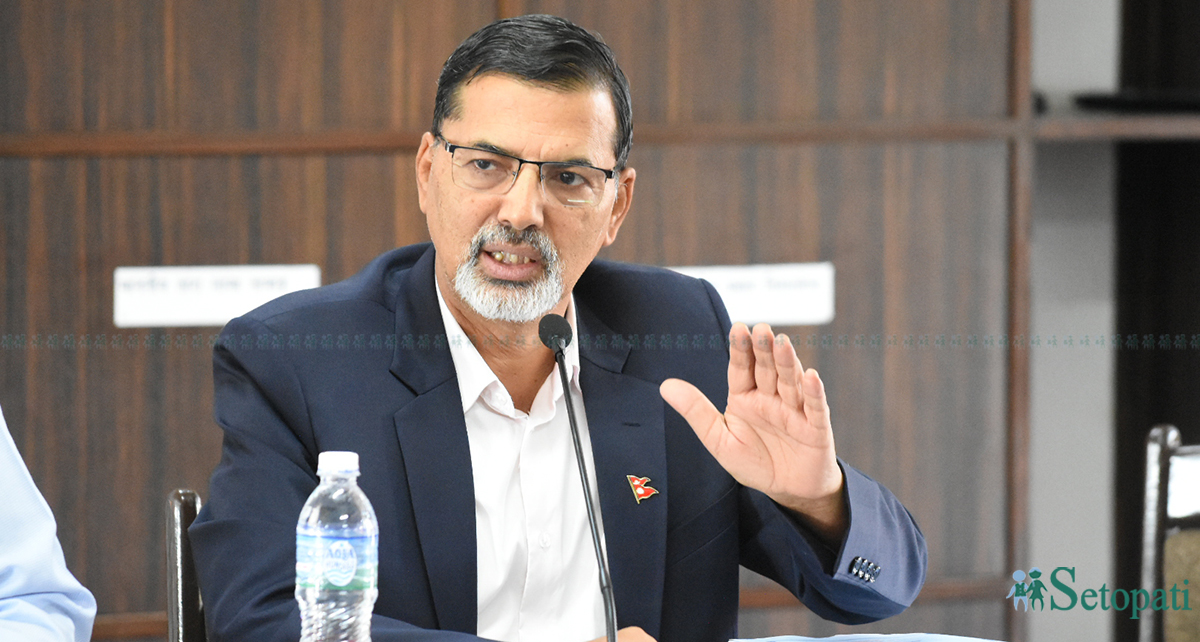Deputy General Secretary of the CPN (Maoist Center), Janardan Sharma, has said that he will dismiss the propaganda claiming that the party will split.
Sharma asserted that no matter how much others try to push him out of the Maoist party, he will remain in it. He also expressed dissatisfaction that the rumors of a possible party split are coming from the the leadership itself.
Sharma said that he is prepared to face any punishment for raising questions about party building. During the standing committee meeting held on Sunday, some members suggested that Sharma needs to be cautioned.
“I raised questions about party building in front of everyone, while others have been saying in private that this party won’t be built. But I am ready to face any punishment for raising such questions about party building. I refute the malicious propaganda that the party will split. No matter how much they try to push me out, I will stand firm in the party,” Sharma said at the standing committee meeting. “If I am responsible for reducing our votes from 3.1 million to 1.1 million, I am ready for self-criticism. Otherwise, self-criticism is needed from the respective quarters.”
He indirectly suggested that Chairman Pushpa Kamal Dahal should engage in self-criticism for the drop in votes.
“If the reason and responsibility for the votes dropping from 3.1 million to 1.1 million lie with me, I will take responsibility and self-criticize,” he said.
He expressed discontent, stating that instead of steering the party toward socialism, the leadership has been promoting liberalism and neo-liberalism while in government.
“We formulated policies accordingly. Although we tried to implement some reforms, they were not tolerated. The affection for me has decreased as our has tried to abandon the path of workers and peasants and moved away from class commitment. When I was finance minister, I introduced pension for farmers, created a program to appoint 300 agricultural volunteers in each local unit, and proposed utilizing fallow land in the budget. I want to make clear that they were canceled without being implemented when our chairman was prime minister. Had our top leadership been sincere about implementing federalism, provinces would have their own police and be stronger by now,” he said, directing his dissatisfaction toward Dahal.
Noting that oppressed classes, ethnic groups, regions, and communities are angry with the Maoists, Sharma also pointed out that issues like identity have been forgotten.
He highlighted that the party’s failure to restructure after joining the peace process and the declaration of the new constitution, its inability to adapt to a new system, its lack of focus on moving forward competitively and with accountability to the people, its centralized mindset, and reliance on old methods are the main problems today.
“Today, our ideological ambiguity, issues regarding political line, organizational system, and procedural crises have given rise to numerous problems. The deviation from a class perspective, inability to address people’s concerns, and failure to provide an alternative for economic prosperity are our serious issues. The solution lies in serious study, research, discussion, and debate on these issues. We cannot find the right path by looking elsewhere. Instead of engaging in accusations and counter-accusations, let’s have debates,” Sharma said.
He also reminded the gathering of the resolution and understanding reached at the last central committee meeting.
He noted that the plan was to conduct campaigns by June, strengthen unity and polarization, make the Socialist Front effective, avoid focusing on the government, and make Parliament effective, but the implementation has been dismal.
“Initially, the campaign was effective, but after Madhes province, its momentum decreased, and by the time it reached the west, it became worker-centric, leader-focused, arbitrary in team deployment, and restrictions were imposed on participating in the campaign,” he said.
Questioning where and from whom these problems originated, he concluded that the issue lies in the division of responsibilities.
“The chairman divided responsibilities based on factions. Those who came through unity and other seniors were humiliated. The work division was discriminatory and biased. Right after the central committee meeting, the chairman said in many places that there would be no general convention,” he said.

